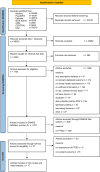The relation between passively collected data and PTSD: a systematic review and meta-analysis
- PMID: 40617877
- PMCID: PMC12228780
- DOI: 10.1038/s41746-025-01825-6
The relation between passively collected data and PTSD: a systematic review and meta-analysis
Abstract
Post-traumatic stress disorder (PTSD) is a common mental disorder. This systematic review and meta-analysis examined the association between mobile sensing features and PTSD symptoms. Studies were sourced from the Database for Mobile Sensing Studies in Mental Healthcare (DAMOS), with inclusion criteria requiring correlations between mobile sensing data and PTSD symptoms assessed by validated tools. Seventeen studies encompassing 1847 participants (mean age = 38.68, 63.18% female) remained after study selection. Of 18 features across sleep, mobility, activity, and social activity, only wake after sleep onset (r = 0.14, 95% CI = [0.03, 0.25]) and relative amplitude of physical activity (r = -0.10, 95% CI = [-0.17, -0.03]) were significantly associated with PTSD symptoms. Findings were consistent across PTSD measurements, populations, demographics, and sensing durations. Although mobile sensing offers unobtrusive, objective, and ecologically valid insights into PTSD, confirmatory studies and research to optimize sensor assessment are needed before clinical practice.
© 2025. The Author(s).
Conflict of interest statement
Competing interests: The authors declare no competing interests.
Figures
Similar articles
-
Psychological and pharmacological interventions for posttraumatic stress disorder and comorbid mental health problems following complex traumatic events: Systematic review and component network meta-analysis.PLoS Med. 2020 Aug 19;17(8):e1003262. doi: 10.1371/journal.pmed.1003262. eCollection 2020 Aug. PLoS Med. 2020. PMID: 32813696 Free PMC article.
-
Psychological therapies for the treatment of mental disorders in low- and middle-income countries affected by humanitarian crises.Cochrane Database Syst Rev. 2018 Jul 5;7(7):CD011849. doi: 10.1002/14651858.CD011849.pub2. Cochrane Database Syst Rev. 2018. PMID: 29975811 Free PMC article.
-
Psychological therapies for post-traumatic stress disorder and comorbid substance use disorder.Cochrane Database Syst Rev. 2016 Apr 4;4(4):CD010204. doi: 10.1002/14651858.CD010204.pub2. Cochrane Database Syst Rev. 2016. PMID: 27040448 Free PMC article.
-
Psychological therapies for the treatment of post-traumatic stress disorder in children and adolescents.Cochrane Database Syst Rev. 2012 Dec 12;12(12):CD006726. doi: 10.1002/14651858.CD006726.pub2. Cochrane Database Syst Rev. 2012. PMID: 23235632 Free PMC article.
-
Pre-deployment programmes for building resilience in military and frontline emergency service personnel.Cochrane Database Syst Rev. 2021 Dec 6;12(12):CD013242. doi: 10.1002/14651858.CD013242.pub2. Cochrane Database Syst Rev. 2021. PMID: 34870330 Free PMC article.
References
Grants and funding
- 202406870011/China Scholarship Council
- 01EE2303A/German Center for Mental Health (Deutsches Zentrum für Psychische Gesundheit [DZPG])
- 01EE2304C/German Center for Mental Health (Deutsches Zentrum für Psychische Gesundheit [DZPG])
- 01EE2304C/German Center for Mental Health (Deutsches Zentrum für Psychische Gesundheit [DZPG])
- 01EE2303A/German Center for Mental Health (Deutsches Zentrum für Psychische Gesundheit [DZPG])
LinkOut - more resources
Full Text Sources


